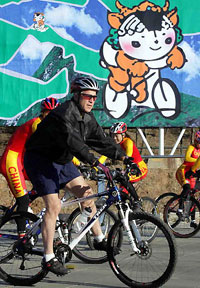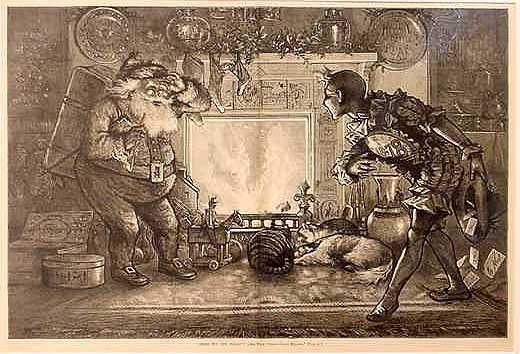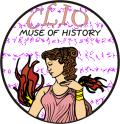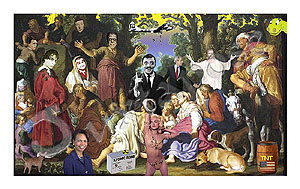 On a Roll?
On a Roll?
Pity our poor President. Even half a world away, the increasingly popular image of him as an affable bumbler continues to dog his efforts. His recent Asian trip, from which he has just returned, is already being archived as the latest episode of an Administration increasingly riven by one marvelous catastrophe after another. There is still much talk, though somewhat muted over the past week, of a “lame duck” presidency, and the abandonment of some of capitalism’s most hoped-for “reforms”, especially the disabling of Social Security.
Such verdicts I think are premature. Bush’s trump cards are formidable; the lack of a tenable alternative (the Democrats, apparently, are even more heartily despised); and, most importantly, a national media that is willing to overlook a lot in the interests of securing Israel. For the time being, at least, Bush is their man. Weaken him, the reasoning goes, and the war against radical Islam, the main force threatening the Jewish state, is dangerously compromised. There, too, the lack of an attractive alternate reality in the Middle East (sectarian Arab autocracies) is a handsome asset to both Bush and the Israelis. Until a viable secular ideology looms as a rival to the fundamentalism of Zionism and Islam, this, as they say, is “it”.
So, what is the future? I mean, what will America look like in four years, regardless of the nomenclature of a succeeding Washington Admnistration?
I imagine we will still be firmly ensconced amid the ruins of our Iraq “democracy” adventure. We may have even “won” by then; that is, we and our opponents may have finally settled on the price of collaboration. The perfectly awful regimes in Damascus and Tehran, too, may be gone. Or, perhaps, having been driven from power either by force of arms or, more likely, through the good offices of “people power,” their proprietors might settle into that sullen acquiescence that has marked so much of the Arab world’s relations with the West. I am reminded again of Macaulay; “There, never, perhaps, existed a people so thorougly fitted by nature and by habit for a foreign yoke.” (Where, I wonder, too, is the Arab Lenin?)
And what about China? Or Japan? It is a safe bet that within a few years the latter will have substantially re-armed herself as a formidable American surrogate, ready at the right time to take the field against Beijing. India, too, I suppose, will have further tied herself to Washington, at least as tightly as her shaky political milieu will credibly allow. The West has never trusted India, nor she they. Nevertheless, Bush may well be remembered, at least in the short term, as the President who both precipitated the re-configuring of the Middle East (in the graven image of Israel and the West), and who “saved” south and east Asia from China.
I think the world media has been a bit off about Bush’s Asian trip, too. I mean, the part about his being a bungling ignoramus at the mercy of forces far beyond his capacity to comprehend, let alone control. There is a hint of truth here. But, wasn’t his trip designed and executed as an exercise in re-assurance? Yes. It was meant as a clear signal that, despite troubles in Iraq and back in Washington, the Bush administration is determined to preserve the status quo in Asia, at least for now. Side trips included supporting Koizumi in his drive to privatize Japan, Inc., as well as solidarity with Taiwan, and a cautious invitation to “ancillory” nations like Mongolia to take a seat at the table. Such goals might seem at first light mundane and unspectacular, but Mr Bush has generally succeeded in reaching them. And at a time when his leadership is widely seen as being beyond redemption, especially by those within his own class and party.
Bush’s latest effort, in short, is an important step in further articulating the goals of Western policy in the coming decades. He has done nothing less than provide a template for future administrations to more or less follow, regardless of their political color.
Of course, the continual prattling on about “human rights” and “freedom” is an enervating reminder of just how much things have changed. Such shibboleths — once a sure-fire means of exciting popular indignation and hostility towards Communism — now ring hollow in a world where economic development has become the talisman of power, regardless of the political color of a regime. “Moral concerns”, particularly if they’re promoted by Western patricians with suspect motives, have been nearly eclipsed by the marvels of booming economies, including ostensibly “Marxist” ones.
And why not? There is something almost unseemly about the leader of a country like the United States –whose history includes the enslavement of one race and the near-extermination of another, and whose overseas entanglements have led directly to the deaths or impoverishment of hundreds of millions of people, — assembling the brass to lecture the rest of humanity on “human rights” Washington’s apparent adoption of torture as a means of waging war has not helped, either.
And then there is the fabled cultural divide between the West and the Far East.
Just what do Asians really think? Do East and West differ in their perceptions of reality? Well, yes, according to Richard Nisbett, whose book The Geography of Thought has just been published by The Free Press. East Asians, the professor tells, tend to be more “holistic” than their Western counterparts, making relatively little use of categories of formal logic. The Chinese, in particular, emphasize the constant of change and recognize inherent “contradictions” and the usefulness of multiple perspectives. Us Westerners on the other hand are prone to the analytic and focus more on objects and their categories. We, unlike them, don’t spend inordinate amounts of time searching for “middle ways” between opposing propositions.
Now, I rather like Professor Nisbett’s book, but he often times seems to be ascribing to Asians what are really the properties of Western liberals like himself. Aren’t things like “attention to contexts” so universal as to be almost impossible to describe as a racial or cultural characteristic? Appreciation of “multiple perspectives”, too, would seem to me to be more at home in a raucous multi-party democracy like India’s (where it is difficult to get anything done in a hurry) than in China’s one party state (where many things get done, and quickly). And do East Asians focus more on contexts and relationships in assessing criminal behavior than, say, readers of The New York Times?
Kudos, though, to the author for at least getting people to start thinking about the relationships between cultures that have been in sharp conflict in the past. I would have liked it better if he had sought to explain such behaviors in the context of capitalism and imperialism and colonialism. The relationships between us and them have been rife with all three. There are differences in perspective when one has been subordinate to a power that until recently has seemed to have gone from strength to strength or when one has been occupied at length by foreign capital and foreign ideas. At such times things like the “constant of change” and the efficacy of “multiple perspectives” assume a new poignancy.
Perhaps we in the West are doomed to savor some of those same experiences as capitalist democracy inevitably runs out of steam and people begin to haltingly but inexorably think about the greatest good for the greatest number — a supposedly “Oriental” trait celebrated in Chinese history and culture — as a model for all civilization.
Now, that’s one change I would like to see. Constantly.






 On a Roll?
On a Roll? 







 It is clear by now that the past 100 years, far from being just another nomenclature of American hubris, was in reality “Democracy’s Century”. Not since the 1700s, with its ubiquitous nicknames “The Age of Reason”, and the “Age of Enlightenment”, has an era produced such a single-minded cachet. It was during this tumultuous epoch that she saw off two potent challengers, one decisively, the other less so (Communism’s ambiguous sequel is still to be played out) and seemed to march from strength to strength throughout the world. Indeed, as the new Millenium approached, the mantra of “free markets, free men, and rule of law” seemed,
It is clear by now that the past 100 years, far from being just another nomenclature of American hubris, was in reality “Democracy’s Century”. Not since the 1700s, with its ubiquitous nicknames “The Age of Reason”, and the “Age of Enlightenment”, has an era produced such a single-minded cachet. It was during this tumultuous epoch that she saw off two potent challengers, one decisively, the other less so (Communism’s ambiguous sequel is still to be played out) and seemed to march from strength to strength throughout the world. Indeed, as the new Millenium approached, the mantra of “free markets, free men, and rule of law” seemed,